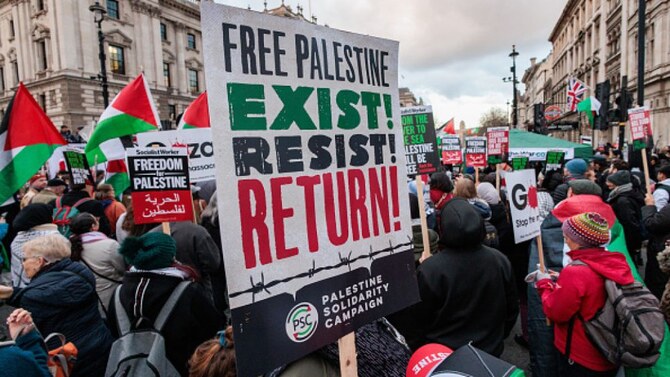LONDON: Saudi Arabia retained its top position in the government strategy category and significantly improved its overall ranking in the fifth 2024 Global AI Index by Tortoise Media released on Thursday.
The Kingdom jumped 17 places, now ranking 14th overall, surpassing the UAE as the leading Arab country in AI.
Joe White, senior data analyst at Tortoise Media and one of the authors of the report, described the leap as “really impressive,” attributing it to large-scale investment by the Saudi government.
“Saudi Arabia has jumped from 31st to 14th (place), which is (a) really good jump. And that’s mainly down to this massive $40 billion investment the Saudi government said it would put into AI, which is just an order of magnitude, higher than any other country,” White said during a presentation on Thursday.

The Global AI Index is a detailed ranking that tracks how countries are performing in the global AI race.
It evaluates nations based on a mix of absolute and relative indicators, assessing their AI capacity in areas such as talent, infrastructure, research and government policy.
This year, the index expanded to include 83 countries, up from 62 in 2023, with new indicators and improved data organized across three pillars: Implementation, innovation and investment.

Saudi Arabia’s clearly outlined AI roadmap, led by the Saudi Data & AI Authority (SDAIA), and significant investments in the field, resulted in it maintaining its top position in the government strategy category, ahead of the US and Canada.
Serena Cesareo, senior researcher at Tortoise Media and co-author of the study, said that the Kingdom’s success in this area was directly linked to its substantial budget allocations for AI initiatives.
“It’s still unclear what they want to do with that money and where they want to direct it,” Cesareo told Arab News, emphasizing that the key question remained of how the investment would be used and what specific initiatives would emerge from it.
Much like the UAE, which was ranked 20th this year, Saudi Arabia has taken a state-driven approach to AI development.
White cautioned, however, that focusing too narrowly on state-led initiatives could limit broader innovation.
“Governments in the Gulf region have a very state-led view of AI; they sort of think it’s the state’s job,” he said.
White warned that an overly centralized approach, where investments focused solely on infrastructure and high-tech models, could limit the broader ecosystem’s potential for organic growth.
He added: “If the focus for Saudi Arabia is too narrow, then they might be missing something. I think that is the dilemma that is going to play out.”

Despite its success in government strategy, Saudi Arabia lags in two categories: Talent and the operating environment. The former refers to the availability of skilled AI professionals, while the latter addresses regulatory frameworks and public sentiment.
“Right now, the UAE is the place (in the region) that is more likely to attract global talent,” said White, highlighting the appeal of cities such as Dubai as global hubs.
He said that although drawing a direct link between geopolitical shifts and talent retention remained a “hard one to make,” shifting geopolitical dynamics and rising tensions involving key AI players such as Israel could affect talent attraction and overall rankings.
SDAIA has launched several initiatives to address the talent gap, including bootcamps in data science and AI.
In September, during the Global AI Summit in Riyadh, the authority announced a partnership with the UK-based educational company Pearson to boost local capabilities in AI and digital fields.

Cesareo and White also spoke about the recent news that the US might lift its ban on exporting advanced Nvidia chips to Saudi Arabia, which would enhance the Kingdom’s AI capabilities.
However, White pointed out that there may be potential trade-offs involved in Saudi Arabia aligning more closely with the US over China.
“There’s a balancing act here,” Cesareo said, noting that Saudi Arabia appeared keen to maintain relations with both global powers.
This year, the US, which was ranked first, continued to play “in a tier of their own” thanks to its strong mix of investment, research and implementation, White said. It is followed by China, despite difficulties in data access, and Singapore, the UK and France.
South Korea, Germany, Canada, Israel and India round out the top ten, with India entering the top ten for the first time due to its large and diverse AI workforce.
Other Arab nations in the index include Egypt (52nd), Qatar (54th), Bahrain (62nd) and Tunisia (71st). Further down the list are Iraq, Morocco and Algeria, highlighting the need for increased government support for AI development in those countries.





























